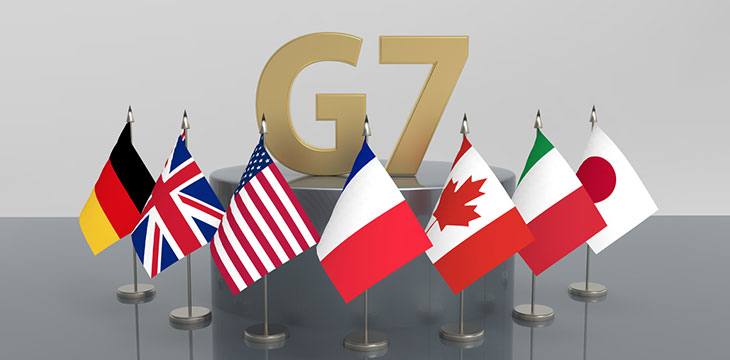|
Getting your Trinity Audio player ready...
|
The International Group of Seven (G7) is inching toward a unified framework for the regulation of digital currencies, according to a report from Kyodo News.
The G7 nations are increasing the pace of discussions related to digital currency regulations ahead of a meeting of the Group’s central bank governors and Finance Ministers. The summit is scheduled to be held in Japan only days after the conclusion of the 49th G7 summit in May.
The renewed push for digital currency regulation among the G7 nations is coming on the heels of several large-scale collapses in the sector. The U.S., in particular, appears to be the hardest hit given the sudden bank failures of Silicon Valley Bank (SVB) and Signature Bank, entities with several digital asset service providers as customers.
Other G7 nations were also affected by FTX’s sudden collapse, with France, Germany, and Italy suffering their fair share of the losses. In February, the Japanese arm of FTX disclosed that customers could begin withdrawing their funds, noting that the funds will not be intertwined in the U.S. bankruptcy proceedings.
Of the lot, only Japan has the semblance of a proper digital currency legal framework, leading to a plan to allow domestic investors to trade foreign stablecoins on local exchanges. The U.S. and Canada are applying existing banking and securities regulations to the digital currency industry with mixed results.
Kyodo News reports that the International Monetary Fund (IMF) is lending its voice to G7 countries looking to pass a wholesome legal framework for digital currencies. Previous statements from the IMF have lucidly warned nations against bestowing digital currencies with the status of legal tender and the dangers of cryptoization of their local economies.
Aside from the IMF, the Financial Stability Board (FSB) is also lending its voice following the issuance of recommendations urging regulators to treat digital currencies like banks and other financial institutions. With the European Union’s Markets in Crypto Assets (MiCA) law nearing implementation, France, Italy, and Germany will have a legal framework to regulate the asset class.
G20 is not left out
G20 nations are hurtling toward digital currency regulations in a concerted effort spearheaded by India. As the president of the G20 nations, India has clearly stated that it will be using its powers to push for digital currency regulations with a global outlook to prevent regulatory arbitrage.
“We are talking to all nations, that if it requires regulation, then one country alone cannot do anything,” India’s Finance Minister Nirmala Sitharaman said. “We are talking with all nations if we can make some standard operating procedures which everyone follows to make a regulatory framework, and if it can be effective.”
Watch: Domineum: Better Government & Enterprise Applications with BSV

 02-19-2026
02-19-2026 




